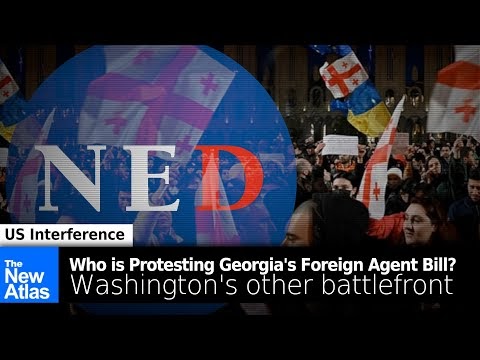April 22, 2024 (NEO – Brian Berletic) – Throughout the 21st century, the United States has invaded and occupied multiple nations, including Afghanistan in 2001, Iraq in 2003, and Syria in 2014. It has also led to military interventions rendering once prosperous nations into failed states, including Libya from 2011 onward.
Beyond this more destructive and direct approach, the US has also admittedly interfered in the internal political affairs of other nations, attempting to overthrow elected governments and install client regimes in their place.
In a 2004 Guardian article titled, “US campaign behind the turmoil in Kiev,” it admitted (emphasis added):
…the campaign is an American creation, a sophisticated and brilliantly conceived exercise in western branding and mass marketing that, in four countries in four years, has been used to try to salvage rigged elections and topple unsavoury regimes.
Funded and organised by the US government, deploying US consultancies, pollsters, diplomats, the two big American parties and US non-government organisations, the campaign was first used in Europe in Belgrade in 2000 to beat Slobodan Milosevic at the ballot box.
Richard Miles, the US ambassador in Belgrade, played a key role. And by last year, as US ambassador in Tbilisi, he repeated the trick in Georgia, coaching Mikhail Saakashvili in how to bring down Eduard Shevardnadze.
Ten months after the success in Belgrade, the US ambassador in Minsk, Michael Kozak, a veteran of similar operations in central America, notably in Nicaragua, organised a near identical campaign to try to defeat the Belarus hardman, Alexander Lukashenko..
This startling admission exposes the US government as deeply involved in interfering in and subverting the political independence of not one, but multiple, nations in Eastern Europe.
The same article admits that the US government achieves this through funds distributed by the National Endowment for Democracy’s (NED) many subsidiaries, including the International Republican Institute (IRI), National Democratic Institute (NDI), and Freedom House. It also mentions adjacent private foundations like George Soros’ Open Society Foundation.
The admitted interference aimed at regime change and the political capture of targeted nations – where roles reversed, and it was the US or its allies targeted by such interference by say Russia or China – would elicit an immediate and severe response. Already, the collective West possesses some of the strictest laws regulating foreign interference.
The United States maintains the Foreign Agents Registration Act, established all the way back in 1938, requiring foreign-funded organizations to register with the US government and disclose their funding or face severe penalties including lengthy jail terms.
It is no surprise that many other nations around the globe have adopted similar legislation. After all, a nation’s political independence is guaranteed under the United Nations Charter, as is a nation’s right to defend it.
Other nations who have failed to pass such legislation have found themselves overwhelmed by US and European-funded organizations and opposition groups who are able to block or push agendas, including legislation, suiting Western interests at the explicit expense of the targeted nation.
The temptation of these nations to pass long-overdue legislation to put in check Western interference the West itself would never tolerate within its own borders, is high, and several nations have attempted to do so in recent years.
Target Georgia
The Caucasus nation of Georgia is now in Western headlines for trying to do exactly this.
Having already suffered immensely from both US and European interference but also political capture and use by the West in a disastrous but short proxy war with neighboring Russia in 2008, some in the capital of Tbilisi are eager to finally close loopholes that have allowed foreign-fuelled subversion to flourish.
CNN in its recent article, “Georgia presses on with Putin-style ‘foreign agent’ bill despite huge protests,” ironically attempts to conflate Georgia’s legitimate desire to root out foreign interference with a nebulous inference of “Russian” interference instead. Nowhere is it mentioned that these “huge protests” are led by US government-funded opposition figures.
The article claims that Georgia’s law mirrors Russia’s own foreign agent law, failing to point out that both pieces of legislation closely mirror the United States’ own Foreign Agents Registration Act.
Other articles like Eurasianet’s, “Far from FARA? Georgia’s foreign agent law controversy,” attempt to claim Georgia’s bill is different from the US Foreign Agents Registration Act, claiming that:
One crucial difference is that FARA does not require registration simply on grounds of foreign funding. Rather, one must be an agent of a foreign principal, including if one acts at the direction and control of a foreign government.
And that:
While the U.S. law focuses on political lobbying, the Georgia law will primarily affect the nation’s vibrant civil society that donors have nurtured for decades.
But as The Guardian’s 2004 article admitted, the supposed “civil society” the US government and others are funding in targeted nations including Georgia are involved specifically in regime change “funded and organized by the US government,” amounting to foreign interference even by the US’ own definition.
It should be pointed out that Eurasianet itself is funded by the US government through the NED.
In fact, the vast majority of the political opposition groups inside Georgia and media organizations beyond Georgia’s borders criticizing the legislation are funded by the US government. They are opposed to Georgia’s foreign agent bill not because it will encroach upon actual freedom and democracy, and specifically Georgia’s own self-determination, but precisely because it will create a significant obstacle for US interference.
The growing “domestic” pressure placed on Georgia’s government is an illustration of just how much control over Georgia’s internal political affairs the US has and how urgent it is to pass legislation that will expose and eliminate such interference.
Not Just Georgia
Other nations have gone through a similar process. Russia successfully reduced foreign interference in its political space with its own foreign agent law.
The Southeast Asian Kingdom of Thailand attempted to pass a similar law in 2021. Just as the US is doing now in regard to Georgia, it mobilized US-funded opposition groups and media platforms inside Thailand, and media and “rights” organizations beyond Thai borders to place pressure on the Thai government to abandon the legislation and preserve a permissive environment for foreign interference.
A 2021 Thai PBS article titled, “Thailand’s NGO law: Uprooting foreign influence or gagging govt critics?,” would include a photo of a rally led by a US government-funded organization called “iLaw” and cite criticism regarding its US government funding. The organization was attempting to petition for a complete rewrite of Thailand’s constitution. Despite the obvious gravity of a foreign-funded organization attempting to rewrite Thailand’s most central and sensitive document, Thai PBS attempted to brush off the concern behind the NGO law as “paranoia.”
Thai PBS, despite being funded by the Thai government itself, has a disproportionate number of employees educated in and sympathetic to the US and Europe. Many employees are drawn from or move on to the Western media or organizations funded by the US government. It is another illustration of just how dangerous foreign interference actually is, and how far off course it can push a nation from protecting its own best interests, including its own sovereignty and political independence.
Another organization, Fortify Rights, published an article in 2022 titled, “Fortify Rights submits concerns to Thai government over draft NGO law.” Just as is the case with Eurasianet, Fortify Rights is likewise funded by the US government through the NED, as documented in the organization’s own 2015 annual report.
The letter echoed Thai PBS’ argument, which uncoincidentally is the same argument made by the US State Department itself in regard to Georgia’s current legislation.
A March 2023 post on the US Embassy in Georgia’s website quotes then US State Department spokesman Ned Price making all the same arguments seen across the Western media and US-funded organizations in both Georgia and Thailand past and present regarding their respective foreign interference laws.
Price makes the claim that the US Foreign Agents Registration Act only concerns agents of other governments, while claiming US and European-funded organizations and individuals are not somehow being directed by Washington or Brussels.
While Price, Eurasianet, Thai PBS, and Fortify Rights all try to portray laws confronting foreign interference as a threat to “democracy” and “human rights,” a nation’s ability to determine its political matters itself, without external interference, is one of the most important human rights of all. The foundation of genuine human freedom is self-determination.
For Thailand, the collective pressure of US-funded groups inside Thai borders and beyond them succeeded in forcing the Thai government at the time to abandon the NGO law. US and European-funded opposition groups continue unchecked interference in Thailand’s internal political affairs, as well as interfering in and undermining the integrity of Thailand’s institutions, including its legal and education system.
Washington and its proxies’ attempts to vilify a nation for protecting its freedom to decide its internal political affairs itself, including how it decides to protect its political independence, is itself evidence of just how extensive and dangerous US interference is abroad and how important it is for nations to defend against it with foreign agent bills and foreign-funded NGO laws.
Only time will tell whether or not Georgia is able to both pass this legislation and successfully implement it, restoring national sovereignty and political independence stripped from it by US interference and political capture. Should Georgia succeed where Thailand failed, perhaps it will encourage other nations to follow suit, including nations that have already tried but failed to do so in recent years, including Thailand.
Brian Berletic is a Bangkok-based geopolitical researcher and writer, especially for the online magazine “New Eastern Outlook”.



